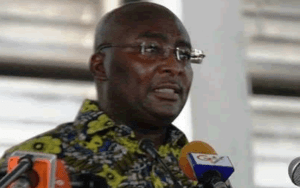Ghana was supposed to start using PayPal by 2020, what happened?

In May 2018, the Vice-President, Dr. Mahamudu Bawumia said Ghana had concluded discussions with PayPal and if all goes well the country would become PayPal compliant within some timeframe, but those timelines have passed, and Ghana is still not compliant.
“I am happy to announce that Ghana has concluded discussions with PayPal and Ghana will therefore, if all goes well, become one of the PayPal compliant countries in two phases. According to the roadmap presented by PayPal, by the second half of 2019, Ghanaian merchants should be able to receive payments for their goods sold online. By the first half of 2020 Ghanaian consumers would be able to make payments for goods and services purchased online via PayPal accounts,” he said.
He noted that it is now up to the country, the Bank of Ghana, GHIPSS, Banks, Fintechs, Telecoms companies and Merchants to make this happen within this time frame and also to prepare for the opportunities it presents.
It’s April 2021 and there is no word on the development. Ghanaians can’t still directly use PayPal, which is one of the most convenient mode of online payment around the world.
While some factors such as fraud has been cited for the reason why Ghana is not one of the countries on the PayPal compliant list, it has been noted elsewhere that, people in Ghana can’t open accounts because PayPal hasn’t found third-party companies to work with to operationalise their services.
In doing this story, ghanabusinessnews.com spoke to some Ghanaians on what they think about the situation , and why Ghana isn’t one of the countries where PayPal is activated.
Aba Dawood Armah is a businesswoman, who runs an online clothes shop.
“I heard from the grapevine it’s because of the fraudulent activities West Africans are known to engage in. Personally, I think it’s because it took us a while to catch up with e-commerce. Barely 10 years ago, it was difficult to find businesses operating online in our part of the world,” she said.
Ms. Armarh added, “most foreign-based clients are suspicious when you tell them you don’t have a PayPal account as PayPal gives the security of a refund if you don’t like a product purchased.
Also it’s easier to buy ads from platforms like Facebook and Instagram when you have a PayPal account.”
Artificial Intelligence expert, Darlington Akogo says, “Ghana and a number of sub-Saharan African countries including Nigeria were blacklisted in 2004 because of incidents related to credit card fraud. Nigeria was taken off the blacklist in 2014, but Ghana, unfortunately, is still blacklisted.”
Tech blogger, Shepherd Yaw Morttey also believes, “a long time ago, people used PayPal for fraud so Ghana was blacklisted.”
Akogo argues that, “the situation has made it tough for the private sector, especially the gig economy to properly integrate with the rest of the world and smoothly transact business. People often have to rely on remittance services to accept money, but those services mostly don’t allow for outgoing transfers. Bank transfers on the other hand have too high charges and fees associated with international transfers, which only becomes a preferred means if you’re dealing with substantially large amounts.”
Morttey who has also written about how to tweak your way to get a PayPal account working in Ghana says the situation is “very bad for business. PayPal is almost a standard for online transactions.”
He also adds that, you have to pass through a long process to get PayPal. And because the account is not very legal, you run the risk of your cash getting locked there.
“And it’s very expensive ($5) to withdraw with card since the PayPal account cannot even be locked to a Ghanaian bank account.”
While PayPal isn’t allowed in Ghana, Morttey says there are ways around it.
“PayPal is not legally active in Ghana. You need to use tweaks to get an account. I urge the government to follow up and pursue the matter to make PayPal available in the country,” he added.
According to Morttey, there is another payment platform, Payoneer. But it also has its problems and it is not widely accepted.
Ms. Armah also points to other platforms.
“I’ll say the closest alternative currently, has been mobile money. Especially with the emergence of apps like World Remit, Wave etc, which has made it so easy for anyone to make payment for services, products wherever they are in the world. It still has its security challenges but it has personally increased my client base abroad.
I actually didn’t hear about it when he (Bawumia) made that promise but clearly it hasn’t materialized as at now,” she said.
By Emmanuel K. Dogbevi
Copyright ©2021 by Creative Imaginations Publicity
All rights reserved. This article or any portion thereof may not be reproduced or used in any manner whatsoever without the express written permission of the publisher except for the use of brief quotations in reviews.

Ghanaians are docile when it comes to these things. I can’t believe an entire country has no legitimate way to engage in ecommerce/online shop in 2023.
Yet the government makes all these noise about digitalization. I didn’t know how impossible it was until I tried to receive payments for my online store. Disgrace and mediocrity nkoaa.